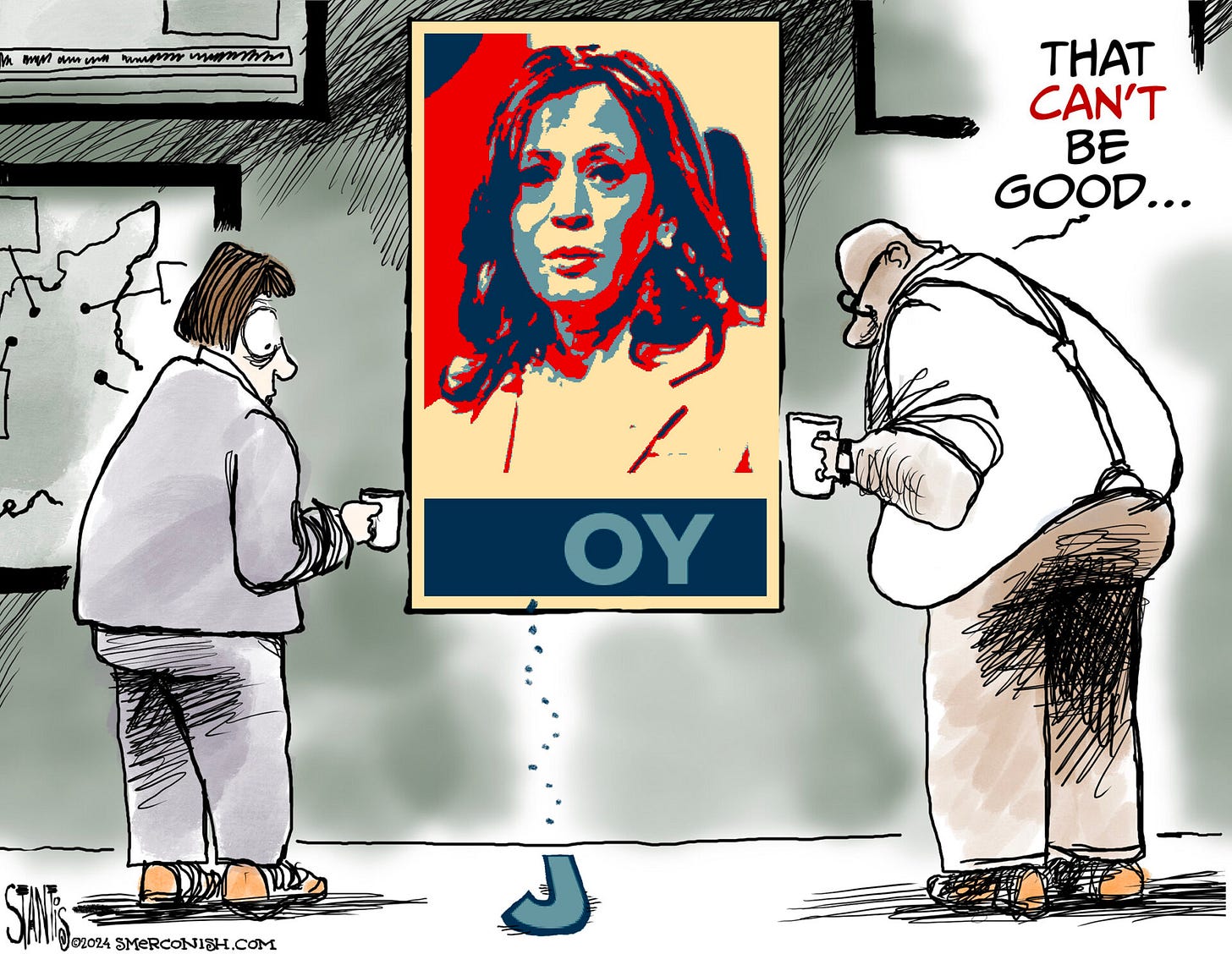“Existential Trouble At The Los Angeles Times” by Daniel Guss
Long-struggling liberal news outlet balks at making a presidential endorsement that would have surprised nobody and impacted nothing. But lies and finger-pointing about it could change everything.
Executive board rooms around the globe continuously conduct SWOT analyses, which are its Strengths, Weaknesses, Opportunities and Threats.
At the Los Angeles Times, its strengths include its financial resources (despite its revenue woes); its visibility in the media landscape and the capabilities of its content creators, including its reporters, columnists, editorial writers, photographers, editors, data crunchers and graphic designers et al.
Its weaknesses include continually lying by omission in its reporting and its undeniable social agenda which inherently interferes with its reporting. Its opportunities include a market demand for truthful, reliable and transparent reporting. And its threats include industry consolidation, artificial intelligence, social media, much leaner online-only competitors (of which there are many) and public indifference.
That last one is critical.
But they pale in comparison to two other threats.
One is forgetting that the Times is a for-profit business, and that its owner, Dr. Patrick Soon-Shiong, didn’t get wealthy by chance. Demonizing capitalism (which goes hand-in-hand with the Times’ disruptive social agenda) and embracing the delusional belief that he is “underwriting” its agenda-saturated content only makes its predicament worse.
The other menacing threat is that in the aftermath of last week’s announcement that it will not issue an endorsement in the presidential race despite its editorial board making recommendations in virtually everything else, finger-pointing between Soon-Shiong, his allegedly interloping leftist daughter Nika Soon-Shiong, the LA Times Guild and its members about what led to the no endorsement announcement last week may be un-survivable.
Apparently, Soon-Shiong’s no endorsement decision had been bubbling-under in the upper reaches of its offices for the past few weeks during which time Editorials Editor Mariel Garza had outlined its endorsement of Kamala Harris for president.
Virtually everyone agrees that such an endorsement at this late stage would have surprised nobody and not changed anyone’s vote. Still, not issuing a presidential endorsement is like having a birthday cake without the candles; it is a measuring stick for its readers. Garza ignited a firestorm by immediately resigning from the Times when Soon-Shiong’s decision was announced.
Last week, the Washington Post (which is owned by mega-billionaire Jeff Bezos) said that it was not making a presidential endorsement either, and was getting out of the endorsement business altogether.
But things quickly went further south when Soon-Shiong, as reported by the Times’ James Rainey, claimed that he told his editorial board to “‘draft a factual analysis of all the POSITIVE AND NEGATIVE policies by EACH candidate during their tenures at the White House, and how these policies affected the nation.’”
Essentially, a SWOT analysis of the candidates.
Rainey reports that Soon-Shiong added, “‘The Editorial Board chose to remain silent,’ Soon-Shiong contended in his X post, ‘and I accepted their decision.’”

But Rainey noted that Garza, and two other journalists who resigned shortly after she did, Karin Klein and Pulitzer Prize-winner Robert Greene, rejected Soon-Shiong’s explanation, quoting Greene saying, “‘…they (the Editorial Board) were not silent but, rather, disagreed with the owner’s proposal.’”
While Soon-Shiong has stated that his daughter Nika had no role in the decision to not endorse, she has implied otherwise, citing Harris’s perceived support for Israel in its response to the Hamas terrorist attack on the Jewish state last October 7th. The younger Soon-Shiong has been an outspoken critic of Israel and those who support it.
According to social media posts, the chaos has caused thousands to cancel their Times subscription, which now exacerbates the news organization’s financial losses for its privately held parent company, Nant Capital, which is rumored to lose many millions of dollars per month on its Times investment.
In January, my column "How Does LA Times' Own Story End?" identified three likely scenarios for what may become of the Times.
With the parties evidently at an impasse about their mission, roles, what happened last week and why, Soon-Shiong and his remaining employees may soon decide that they have had enough of one another.
The worst news for all of them is that hardly anyone outside of their universe cares.
(Daniel Guss, MBA, won the LA Press Club’s “Online Journalist of the Year” and “Best Activism Journalism” awards in June ‘23. In June ‘24, he won its “Best Commentary, Non-Political” award. He has contributed to CityWatchLA, KFI AM-640, iHeartMedia, 790-KABC, Cumulus Media, KCRW 89.9 FM, KRLA 870 AM, Huffington Post, Los Angeles Daily News, Los Angeles Magazine, Movieline Magazine, Emmy Magazine, Los Angeles Business Journal, Pasadena Star-News, Los Angeles Downtown News and the Los Angeles Times in its sports, opinion, entertainment and Sunday Magazine sections among other publishers.)





